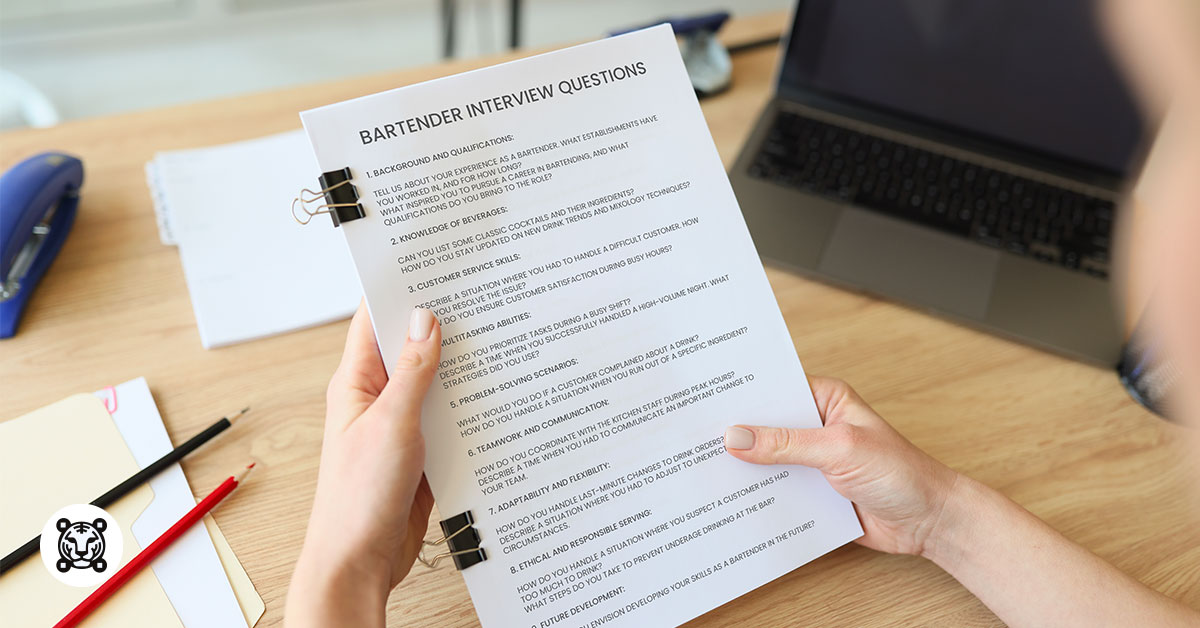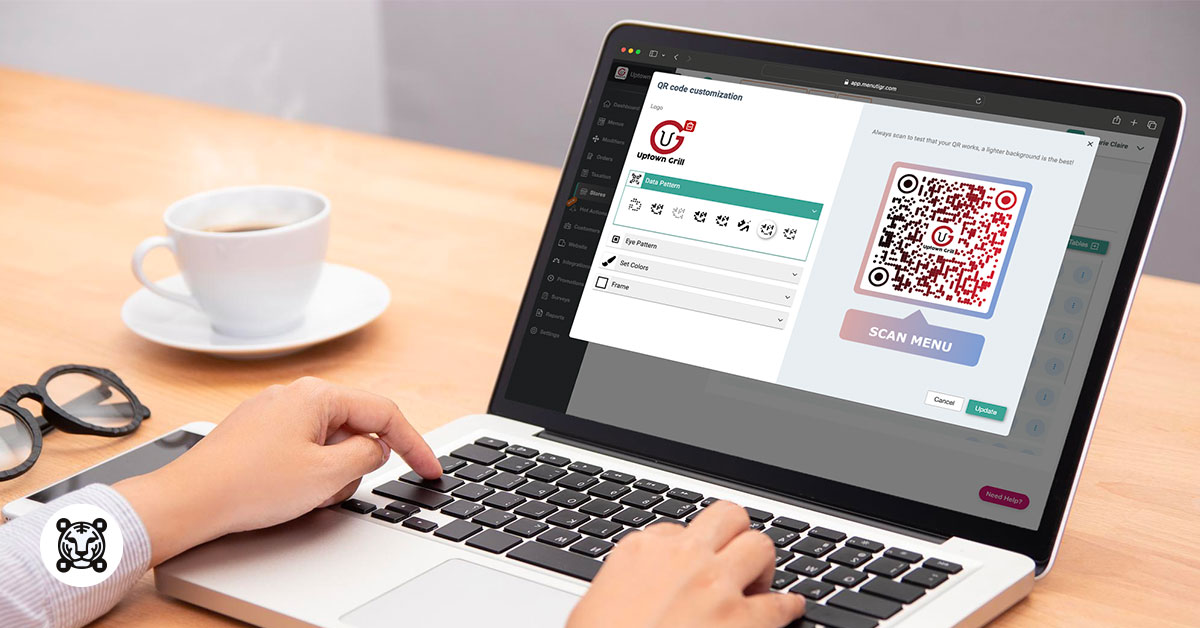
9 Steps In Creating Effective Bartender Interview Questions
Last Updated: July 17, 2025
Looking for a bartending superstar?
One effective way to do that is having an effective set of bartender interview questions that unlock the candidates’ abilities for you to assess their suitability for the role.
To come up with these questions, you must first understand the importance of having an effective one, research the job title you offer, and identify the key competencies and skills that the applicant should possess.
Next, think of creative ways to showcase their bartending skills, such as inventing drinks that can be additional items in your QR code menu.
Make it available for your customers to order and encourage them to leave their reviews on the drinks, making it a valuable insight to help you evaluate the skills of your applicants.
To give you a head start, we’ve collated steps on how you’ll craft effective questions for your interview process.
Why is it important to make effective bartender interview questions?
The role of a bartender goes beyond simply mixing drinks; they are often the face of the business, responsible for creating a welcoming atmosphere and delivering exceptional customer service.
Asking bartender applicants or other candidates targeted bar and restaurant interview questions is paramount to assess their abilities directly, ensuring upholding the reputation of your business.
How to create bar interview questions: 9 essential steps

Crafting effective targeted bartending interview questions can be challenging, particularly if you’re a beginner in this industry.
With that, we’ll walk you through these essential steps to create impactful questions to help you build a top-notch team.
Understand the importance of effective interview questions
Before diving into the interview process, knowing the significance of having well-crafted questions is crucial.
These questions are your primary tool for assessing a candidate’s suitability for the bartender role.
It helps you select individuals who can deliver exceptional service and uphold the reputation of your bar.
Research the job title and responsibilities
Begin by thoroughly researching the job role and the associated responsibilities of a bartender.
Having a grasp of bartending, including drink preparation, customer interaction, and maintaining a welcoming atmosphere, is paramount for a candidate.
Here is a list of responsibilities of a bartender that you can benchmark in your questions:
- Making drinks
Bartenders should be skilled in mixing and preparing various alcoholic and non-alcoholic beverages according to the patrons’ preferences and established recipes.
- Providing excellent customer service
They know how to interact with customers, take orders, offer recommendations, ensure guests have positive experiences, and professionally handle customer inquiries and complaints.
- Maintaining cleanliness
Bartenders are responsible for providing customers with a clean and hygienic bar area. This includes regularly sanitizing surfaces, glassware, and utensils and ensuring the bar is well-organized and clutter-free.
- Managing stocks and inventory
Keeping track of inventory levels and restocking supplies of your bar menu is essential. Bartenders monitor the stock level of alcohol, mixers, garnishes, and other bar supplies, placing orders as needed to ensure that the bar is always adequately stocked.
- Handling payment process
Bartenders handle cash transactions, process cashless payments, and reconcile cash drawers at the end of their shift. They must accurately tally sales, provide correct change, and follow established procedures.
- Knowing beverages
They should have a thorough knowledge of different types of beverages, including their ingredients, flavors, and serving techniques. This covers introducing bar menu ideas that can be an addition to your offerings.
- Adhering to legal regulations
They must comply with all the relevant laws and regulations governing the sale and service of alcohol. This includes verifying the legal drinking age of customers, refuting service to intoxicated individuals, and adhering to responsible serving practices.
This foundational knowledge will inform the development of targeted interview questions tailored to the demands of the position.
Identify key competencies and skills
The next thing you’ll do is pinpoint the core competencies and skills essential for success as a bartender.
You can tailor your interview questions to assess your candidates’ proficiency in these areas by identifying key competencies.
This includes their mixology expertise—the art of making and preparing cocktails and other beverages—customer service prowess, communication skills, multi-tasking, and problem-solving abilities.
Choose the right question types
Effective interview questions come in various forms, each serving a specific purpose.
In drafting your interview questions, incorporate a mix of behavioral, situational, and technical questions to evaluate your candidates comprehensively.
This approach allows you to assess their past experiences, problem-solving abilities, and practical knowledge of bartending techniques.
Craft clear and concise bartender interview questions
Clarity is paramount when crafting interview questions.
Make sure that each question you make is easy to understand, providing aspiring bartenders a clear direction for their response.
Keeping these questions concise and straightforward facilitates meaningful dialogue during the interview process.
Focus on specific examples and experiences
Don’t forget to encourage your candidates to draw upon their past experiences by asking questions that prompt specific examples.
Whether addressing challenging customer interactions or showcasing their mixology skills, these real-life scenarios provide valuable insights into a candidate’s capabilities and suitability for the role.
Align questions with your company’s culture and values
Your questions should assess technical proficiency and check your candidates’ alignment regarding perspective to your company's culture and values.
Make questions that delve into their approach to teamwork, customer service philosophy, and commitment to creating a positive environment.
Test and refine your bartender interview questions
Before conducting interviews, take the time to test your questions with colleagues or industry experts.
Solicit clear, relevant, and effective feedback, and use this input to refine your questions.
Through iterative testing and refinement, you can ensure that your interview yields meaningful insights into candidates’ qualifications.
Implement and evaluate interview questions
With your finalized set of interview questions, implement them in your bartender hiring process.
As you conduct your interviews, evaluate the effectiveness of your questions in eliciting informative responses.
Iterate and add points as needed to optimize your approach and enhance your ability to identify top-tier bartender candidates.

5 don’ts to avoid in crafting bartender interview questions
You might unintentionally focus on certain areas when formulating interview questions and set aside those that might be more crucial in hiring the right candidate for the job.
To help you with this, here is a list of things to avoid in your crafting phase:
Don’t focus solely on technical skills
While technical skills like drink preparation are important, don’t limit your questions to just these.
Bartending also requires strong personal skills, customer service abilities, and the capacity to handle high-pressure situations.
It’s better to include questions that assess these aspects as well.
Don’t ask overly generic queries
Avoid broad or generic questions, as they may not provide meaningful insights into the candidate’s suitability for the role.
Instead, tailor your questions to assess specific qualities or experiences relevant to bartending, such as dealing with difficult customers or managing inventory.
Don’t neglect situational bar interview questions
Situational questions can provide valuable insights into how candidates would handle real-life scenarios they might encounter on the job.
However, avoid using overly contrived scenarios and focus on situations common in bar settings, like managing a crowded bar area or handling a customer complaint.
Don’t forget to probe for cultural fit
Bartenders play a crucial role in shaping the atmosphere and culture of a bar.
Evaluating whether candidates align with your business’s values, vibe, and customer demographic is essential.
So, you need to ask questions that delve into their personality, communication style, and approach to customer service to gauge cultural fit.
Don’t overlook giving follow-up questions
Follow-up questions are essential in the interview process to gain insights into candidates’ responses and clarify any ambiguities.
Avoid moving too quickly from one question to the next without probing further or seeking additional examples or explanations from the candidate.
Take the time to dig deep into their responses and explore relevant details.
11 sample questions to ask a bartender in an interview

“Can you walk me through your experience in bartending? What types of establishments have you worked in, and for how long?”
This question allows the candidate to provide an overview of their background in bartending that showcases their experience and the variety of establishments they have worked in.
It helps you gauge their familiarity with different bar settings and customer demographics.
“How do you prioritize and manage your time during busy hours to ensure efficient service without compromising quality?”
It gauges the candidate’s ability to handle stressful situations and prioritize tasks effectively.
It also gives you an insight into their time management skills, which are crucial for providing prompt and quality service during peak hours.
“Describe a situation where you had to handle a difficult or dissatisfied customer. How did you address the issue, and what was the outcome?”
By asking about a customer service scenario, you can evaluate that candidate’s interpersonal skills and ability to handle challenging situations.
Look for examples of empathy, problem-solving, and a commitment to customer satisfaction.
“In a changing environment, how do you stay organized and maintain attention to detail, especially when managing multiple drink orders at once?”
By answering this question, you’ll know the candidate’s ability to handle multitasking, a critical skill in a busy bar.
Look for responses highlighting organizational strategies, attention to detail, and the capacity to handle several tasks simultaneously.
“What is your approach to handling cash transactions and managing the register? How do you prevent errors in handling money?
This type of question explores the candidate’s financial responsibility and attention to accuracy.
Seek answers demonstrating a solid understanding of cash handling procedures, integrity, and measures to prevent errors.
“Can you provide examples of your knowledge of different types of alcohol and cocktail recipes?”
Asking this kind of question determines the candidate’s expertise in bartending by evaluating their knowledge of alcohol and mixology.
Look for a commitment to staying current with latest industry updates, drinks or cocktail trends, which showcases a passion for the craft, and a dedication to continuous learning.
“Communication is crucial in bartending. How do you communicate clearly and effectively with customers and other staff members?
This kind of question focuses on communication skills that are vital for providing excellent customer service and collaborating with the team members,
Look for candidates who emphasize clear communication, active listening, and effective interaction.
“Describe a time when you had to adapt quickly to a change in the work environment or an unexpected situation. How did you handle it?”
It provides information about the candidate’s adaptability and problem-solving skills by asking about experience dealing with unexpected changes.
Look for flexibility, quick thinking, and a positive attitude in their response.
“Bartenders often work as part of a team. Can you share an experience where effective teamwork contributed to a positive outcome or resolved a challenging situation?”
Explore the candidate’s ability to work collaboratively by asking about a teamwork experience.
Look for examples that highlight communication, cooperation, and a positive impact on the overall operation.
“What steps do you take to handle situations where customers may be underage or intoxicated?”
This question examines the candidate’s understanding of legal responsibilities and their ability to enforce age restrictions.
Look for answers demonstrating a commitment to following regulations and responsible service practices.
“In your opinion, what makes a bar atmosphere enjoyable for customers? How do you contribute to creating a positive and welcoming environment?”
This question explores the candidate’s understanding of customer experience and their role in shaping the atmosphere.
Look for responses emphasizing creating a positive, welcoming ambiance and engaging with customers to enhance their overall experience.
Assessing applicants’ knowledge of QR code menu technology

One innovative approach you can use in the hiring process is incorporating restaurant technologies like MENU TIGER.
It serves multiple purposes, like testing candidates’ adaptability to new technologies, ability to navigate digital interfaces, and creativity in tech solutions for practical scenarios.
The 2024 QR code menu forecast has indicated that 78% of the respondents in a survey by Restaurant Business preferred using menu QR codes rather than traditional ones. This result implies the use of this advanced tool is paramount not just to streamline operations but also to create an interactive way for job screenings.
Here’s how you’ll use this QR code menu software for your interview questions:
Streamline tech adaptability test using a digital menu QR code
Present candidates with a food menu QR code that links to your drink menu and ask them to navigate it to find specific items or information.
This tests their comfort level with new technology and their ability to understand and interact with a digital interface quickly.
But, with MENU TIGER’s user-friendly features, using a digital menu QR code for the first time would be as easy as a pie.
Evaluate the candidates’ creativity by letting them make their own drink menu
Of course, before potential bartenders submit their application, they should list what drinks to know for bartending interviews.
Ask the candidates to make a set of drinks that your team can try. Instruct them to think outside the box when creating or upgrading these drinks.
By doing this, they’ll showcase their ability to craft buzz-worthy drink menu ideas essential to your brand’s image.
To evaluate these, use MENU TIGER’s feature on customer feedback using a QR code. Your team can scan and leave their reviews, making it easier for you in your decision-making.
But make sure to add instructions on how to scan a menu QR code for a smooth evaluation process.
The wrap-up: Incorporate QR code menu software in crafting effective questions to find the right person
Remember that having the right bartender interview questions can be the key to unlocking the perfect candidate for your bar.
By asking thoughtful, tailored questions that delve into their skills, experiences, and fit for your establishment, you can find a bartender who mixes great drinks and embodies the spirit of your bar.
But it does not only stop there; With MENU TIGER’s advanced features, it’s like you have an extra set of hands with an innovative mind to help your team out.
Through this QR code menu software, you can set up various skill tests for the candidates and streamline the evaluation process using this technology, making it more accessible to filter out applicants and choose the right fit for your bar.
So, shake up your interview process with the essential questions and raise a toast to find your perfect mix.
FAQs
Chevy
Before joining MENU TIGER's Content Team, Chevy has been dabbling in literary arts for five years, specifically creative writing in a theatre company. She loves exploring her creativity through painting, photography, and contemporary dancing.


